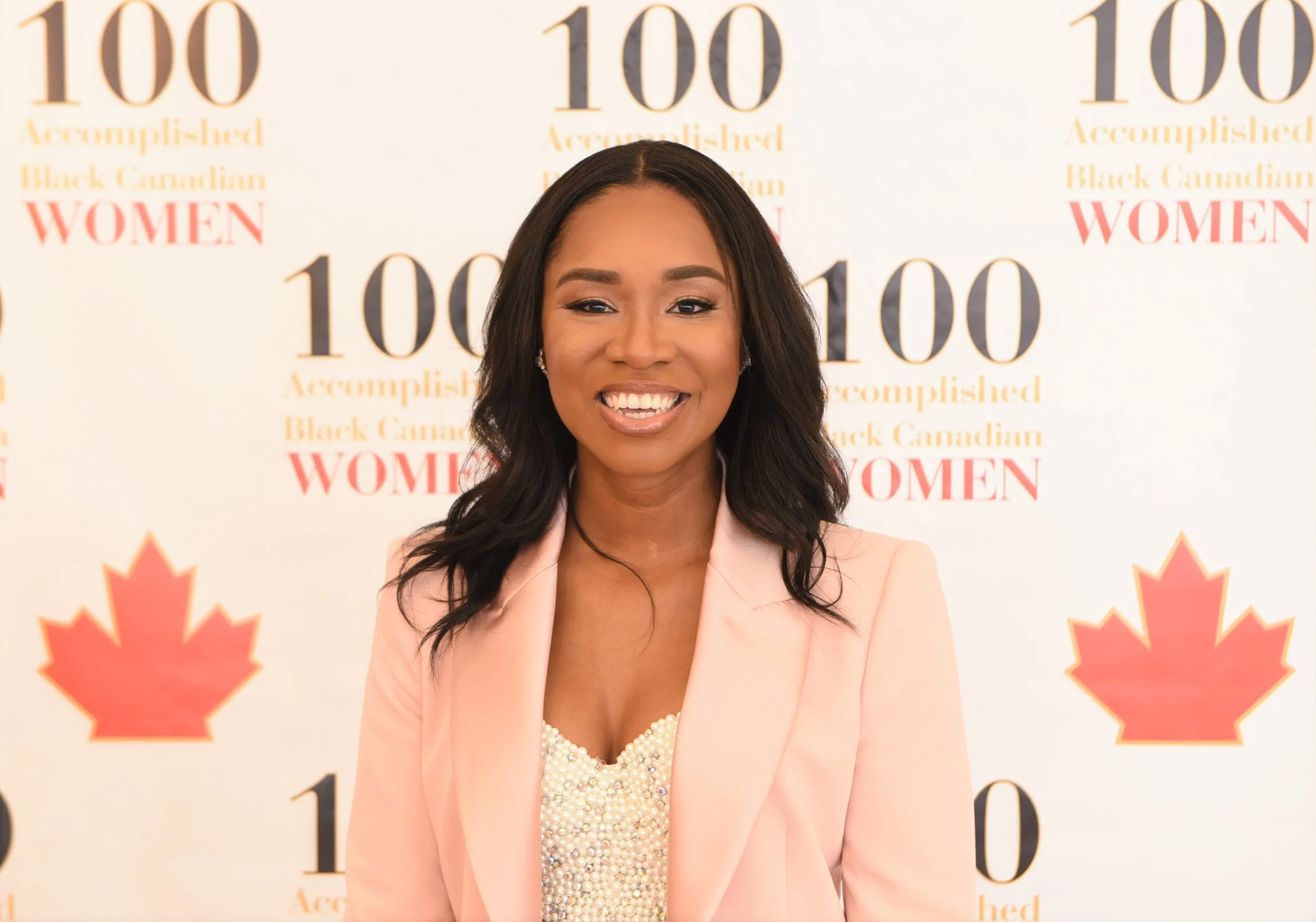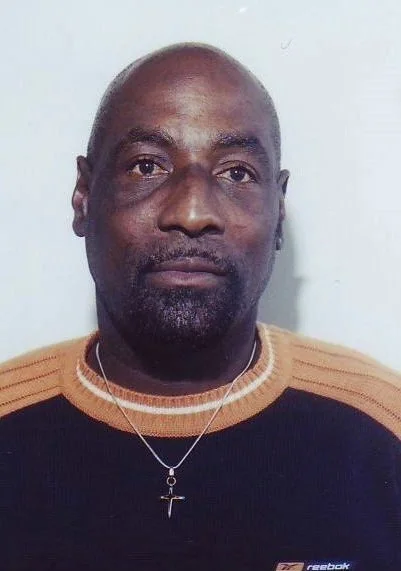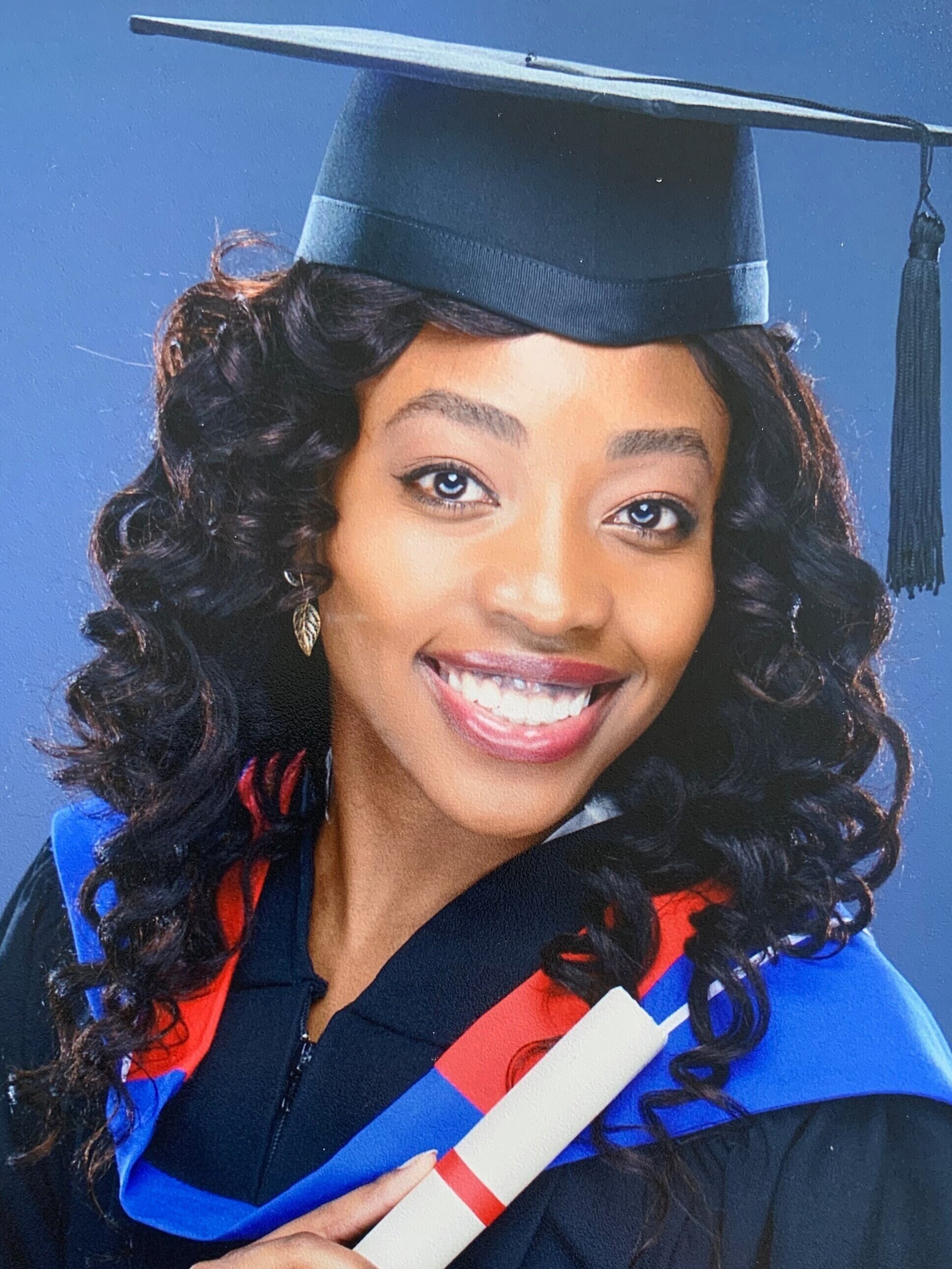Inspired by her sister, Dr. Krissy Doyle-Thomas is a renowned neuroscientist and researcher
May 10, 2024
Just the other day, Dr. Krissy Doyle-Thomas was reminiscing with her sisters about the times when she lined up her stuffed animals on the bed and, with a ruler in hand, pointed to the wall as if she were teaching them.
Later on, June Doyle would blurt out, ‘Dr. Krissy, Dr. Krissy, your mom is on the phone’.
When she obtained her doctorate 14 years ago, mom reminded her daughter she called it.
Inquisitive and yearning to be in a profession where she could help people and uplift communities, it is no surprise that Doyle-Thomas is making a significant impact in supporting individuals in educational and health settings.
“Those two professions have resonated with me as a way of connecting authentically with people,” she pointed out.
Doyle-Thomas was turned on to neuroscience after the youngest of the four female siblings – Eddie-Marie – was born with global developmental delay and had some complications at birth.
“We knew there would be complications with her development across time,” she said. “We didn’t see that manifest until she began to grow and get older and miss developmental milestones, whether they may be motor, cognitive or intellectual.”
The challenges became evident when the family migrated from Trinidad & Tobago in 1991.
Eddie-Marie was three years old then and they spent a lot of time at SickKids Hospital.
“Countless hours were taken up with folks who were trying to advise us how to support a child with special needs within the academic and school setting because we were trying to learn how to navigate the system,” said Doyle-Thomas. “Being inquisitive, I wanted to know what it meant medically for my sister’s body and her development.”
Neurological conditions are the leading cause of ill health and disability and one in three people will be affected by a neurological disorder.
As an independent researcher, Doyle-Thomas is uniquely positioned to translate her field knowledge to help her sister who is seven years younger and assist families who face some of the challenges her family experienced.
“As a child growing up with my sister, the impact was not felt very much other than this is what I learnt in class today and what that sounded like,” the Medical Neuroscientist pointed out. “I was not in a space within my career that I could have helped at the moment. Now that I am qualified, the impact is greater. The brain can change across our lifetime, so our experiences help to train our brain in certain abilities. As our brain matures, things get easier. Helping my sister understand that now things might be difficult because her brain is different, but it will get easier with time the more she practices and leans into the learning.”
As the most complex part of the body and the most complicated object in the world, the human brain fascinates Doyle-Thomas who has published numerous high-impact peer-reviewed articles and has presented her research at conferences nationally and internationally.
“During all of my studies, I have stayed within the brain,” she said. “My biggest interest is how the brain develops and how it looks in childhood-onset disabilities. I intended to research global developmental delay, but that was not a big research area at the time. So, I went into autism which is another type of developmental disability that is anchored in the brain to figure out if there are things I could learn within this field.”
Dr. Krissy Doyle-Thomas is a distinguished educator and mental health consultant (Photo by Ron Fanfair)
After completing her PhD in Medical Sciences at McMaster University in 2010, Doyle-Thomas accepted a post-doctoral fellowship at Holland Bloorview Kids Rehabilitation Hospital Autism Research Centre.
There, she used Magnetic Research Imagining (MRI) to investigate the brain’s structural and functional properties among those with autism spectrum disorders and how the properties relate to clinical symptoms.
Dr. Evodkia Anagnostou, who two years ago was appointed Vice-President of Research at Holland Bloorview Kids Hospital, and Doyle-Thomas are co-investigators in a multi-million-dollar grant.
“The grant aims to figure out what these childhood-onset disabilities look like from genetic, brain and phenotypic and see if there are profiles, regardless of diagnosis, that cluster groups of kids in a way that makes certain treatments more effective for them,” said Doyle-Thomas who was Anagnostou’s first post-doctoral Fellow mentee.
“My role is to lead a national survey understanding what marginalized communities want out of research. What we have found is that a majority of our data from the over 4,000 kids in the program are from affluent families that don’t look like the cultural diversity within Canada. We have a lot of data about one type of cultural group. We don’t know about marginalized communities. Hopefully, the research will help to inform best practices that we can apply to our research. Once it is published, other researchers can use that within their practices to work collaboratively and respectfully with these marginalized communities which all have kids with the same diagnoses. They are not just tapping into the resources in the same way that, maybe, a White family might.”
Since November 2016, Doyle-Thomas has been a Professor at Mohawk College where she co-developed and teaches Ontario’s first graduate certificate programs – Brain Disorders Management and Mental Health & Disability Management.
“Not only do we have domestic students who have health-centred backgrounds, but we have a lot of international medical professionals in the program,” she said. “What I love most about teaching is those conversations within the classroom where that diversity in experience makes the discussions much richer. As a lifelong learner, I am learning from them. That kind of collaborative space within the classroom is exciting for me and it fuels much of my research because I have that diverse thought from within the classroom having me think differently about where the gaps are that we still don’t know in this space and how can we support answering those questions.”
Dr. Anne-Marie DePape, Mohawk’s Associate Dean of Allied Health, invited her to join the college staff.
“What is great about these two programs is that, especially within the brain disorder management program, we help folks understand neurological conditions across the lifespan from childhood into brain injury and neuromotor and those disorders that are neuro generative,” said Doyle-Thomas who, in 2022, was listed among the top 100 Accomplished Black Women in Canada. “Over time, the brain degenerates and we get things like Parkinson’s, dementia and ALS.
“Similarly, in the mental health and disability management program, we talk about co-diagnoses. Someone might have a mental illness as well as another health diagnosis. How do we understand those co-diagnoses and how do we support those folks within the interventions and treatments that exist? Someone might have dementia and depression. How do we support those individuals who have more complex needs? With these two programs, we are trying to support community-based health professionals to understand the theory behind these conditions and how to support them based on evidence-based practices which is research.”
The programs also address strokes that are triggered by lifestyle choices and conditions that weaken or damage arteries, causing clots to form.
“It is a leading cause of disability within the community and an area that a lot of our community agencies are supporting folks with,” said Doyle-Thomas who was the recipient of a Centres for Leadership (CfL) grant to examine the feasibility of using near-infrared spectroscopy (NIRS), an inexpensive, portable, non-invasive imaging tool, to detect the cortical pain response in children with ASD.
Featured in CBC’s HERstory in Black which was an initiative that celebrated Black History Month and Canada’s 150th anniversary celebration in 2017, the University of Calgary Health Sciences Master’s graduate is collaborating with DePape and Mohawk’s Multi-Sensory Lab Technologist Kaela Millar on investigating the impact of Multi-Sensory Environments on well-being in individuals with Acquired Brain Injuries.
Doyle-Thomas is also at the centre of Mohawk College research to advance inclusive mental health support for Black Canadians who face myriad barriers to accessing mental health services, including stigma, financial constraints, challenges securing family doctors, lack of culturally sensitive care and systemic issues within the health care system that perpetuate inequities.
She is leading the applied research project that involves Black community stakeholders to offer a framework for a psychoeducation program that will meet Black Canadians’ unique needs.
The federally-funded Canadian Institutes of Health Research Planning & Dissemination Grant supports the project.
“Our system is very Eurocentric and defines care in one way whereas, in the Black community, we come from different countries, we have different practices and norms, we have different ways of defining family and we have different barriers, even within the system,” she pointed out. “We even have family structures that impact our ability to understand our symptoms to seek care and to even have culturally-sensitive care. If we are going to support the Black community, diagnosing and treatment must look like the Black community as opposed to saying we need to fit into a mainstream system that does not always do things that are in our best interest.”
Is there any neuroscience-related problem that Doyle-Thomas would like to solve or study?
The answer is a definitive ‘yes’.
The certified trainer in LivingWorks safeTALK wants to engage in research that will lead to strengthening the community’s understanding that mental health is anchored in brain function.
“My passion right now is mental health,” Doyle-Thomas, who enjoys reading and binge-watching crime shows with her hubby, pointed out. “I want to better understand and communicate the link between brain health and mental health. We know that any kind of health condition of the body is anchored in an organ. So we have to know also that the mental health experience is anchored in the function and the structure of the brain. So how does brain chemistry affect mental health and how do certain lifestyles influence that chemistry and the way these structures connect more effectively to support well-being? Mental health seems to be quite abstract. How do I feel and what are my thoughts? It makes it very difficult for people to know there are very physical changes that happen within our body that create these feelings, thoughts and emotions”.
With parents leading God-centred lives, Doyle-Thomas relishes the solid foundation they laid.
Eddison and June Doyle split time between the Greater Toronto Area and T & T where the family patriarch – a former Festival Management Committee Chief Financial Officer and Financial Consultant -- is the Chief Executive Officer of Acropolis Medical Centre in San Fernando where he was born and raised.
His wife of 50 years is an author and motivational speaker.
“Just the closeness within our family has been effective for their children,” the distinguished educator and mental health consultant said. “They support our dreams and they open doors for us. If they can’t open doors, they encourage us to think through our approach so that we can broker those connections which is very powerful. Growing up, Sunday lunch at the table after church was non-negotiable. That was a tradition and a big thing because we caught up on everyone’s life. That connection has been powerful as we got older. I am very privileged to be part of a supportive family and that has modelled a lot of behaviours I have adopted as my own.”
Dr. Krissy Doyle-Thomas and her husband Kwesi Thomas (Photo by Ron Fanfair)
A member of the Harris Brand Foundation female mentorship team to support women athletes in nurturing their mental wellness and understanding brain-based strategies that promote personal growth and academic excellence, Doyle-Thomas and her husband, Kwesi Thomas, are proud parents of two young boys who are elite athletes.








